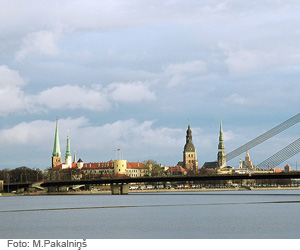The population approves of the activity and processes of the Riga municipality
In April and May of 2008, the Riga City Council Development Department repeatedly surveyed inhabitants of Riga. The survey, done in collaboration with the Marketing and Public Opinion Research Centre SKDS, was completed in order to establish the level of satisfaction of the population of Riga in regard to the activity and processes of the municipality within the city.
The satisfaction level was studied within the framework of supervision of the implementation of Riga development documentation, by choosing indicators according to Riga’s long-term development strategy until 2025 and Riga’s development programme from 2006-2012. Overall, the average index comparison shows that the population’s 2008 evaluation has not substantially changed from that of 2007 – the population of the city is more pleased than not with the activity and processes of the Riga municipality.
Riga’s long-term development strategy until 2025 includes an overall document for the development plan, which stipulates preconditions for the long-term development of the city. Strategy monitoring holds a substantial role and is intended to reflect the document’s association with the activities carried out in the city by the municipality. The survey completed within the framework of this monitoring includes 12 qualitative indicators, which indicate changes in the population’s satisfaction level regarding living and employment possibilities within the city: An educated and skilled community, living in the city with qualitative residential areas, a secured community, a healthy and active community, a socially supported and cared-for community, a community spiritually rich and respectful of culture, an informed community, a comfortably and easily accessible city, a clean and green city, a safe city environment, a city with qualitative habitation and effective city administration. A supplemental survey established areas that have seen noticeable improvement of situations within the last year; solvable issues in Riga were also defined.
According to the 2008 survey results, the indicator with the highest approval rating from the inhabitants of Riga was the “Community Spiritually Rich and Respectful of Culture”. Data were collected within this indicator with regard to the respondents’ general attitude toward cultural events in Riga, as well as in regard to opportunities for children and adults to participate in groups and amateur collectives. It should be noted that this indicator was the second highest valued in 2007. The population of Riga responded with equal positivity toward the indicators “A Secured Community” (on employment opportunities in Riga) and “A Clean and Green City”, where data on the following issues were collected: accessibility of sewerage, noise levels, amount and quality of natural environments, air quality, the cleanliness of the territory and the quality of drinking water. On the other hand, indicators such as “A Safe City Environment”, which describes the satisfaction of Riga inhabitants in regard to personal and residential safety, and “A City with Qualitative Habitation”, which includes the quality and availability of habitation in the city, received lower approval ratings. Furthermore, as in revealed by the 2007 survey, the attitude expressed toward the indicator “An Informed Community”, which includes the respondents’ ratings in regard to the possibility to receive information on municipality activities (i.e. plans and decisions), was also less than positive.
The Acting Director of the Riga City Council Development Department, Gvido Princis, says: “One of the most material stages in the city planning process is to oversee and make sure that the set goals are achieved. The basic goal of Riga’s development is to improve the population’s quality of life – this is why the opinions of the inhabitants, regarding what is going on in the city, are so essential. Currently, we see that the activities and processes implemented in the capital city are approved by the population, but that there are areas in need of improvement, for example, in issues of accessibility of information. It should be noted that the department is currently actively working on this information and on improving the transparency of the decision taking process”.
Within the framework of the survey, inhabitants of Riga also answered to a question on “the positive things” – progress that has been made in the city within the last year – as well as indicated issues that Riga should address first and foremost.
In analysing data on “the positive things”, or progress and improved situations within the last year, 27% of survey respondents indicated an improvement in traffic, mentioning improvements in public transportation (transit schedules, routes, new trams, trolleys, buses, as well as the approval rating of installed compressors), street reconstruction and construction of the South Bridge (Dienvida tilts). 18% of respondents mentioned various issues in regard to the environmental sector – a tidier, cleaner city and park, tidied-up grassy areas, maintenance. Somewhat less frequently, 17% of respondents mentioned various improvements that could be made to the city landscape – construction, building renovation and renewal.
In response to the issue of solvable problems in Riga, 43% mentioned aspects in relation to improving traffic – reducing traffic congestion (21%), street renovation (13%), public transportation (8%), etc. Overall, 30% of respondents named several aspects of living expenses – inflation, public utilities, pension and public transportation.
2000 respondents, ages 15 and up, participated in direct interviews. The first survey of this kind was completed in July and August of 2007; in the future, the City Development Department plans to execute this type of survey annually, in order to be able to apply detailed analyses to the results and compare them to specific periods of time.
Riga City Council City Development Department
Public Relations Department


